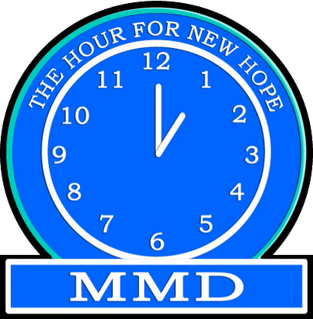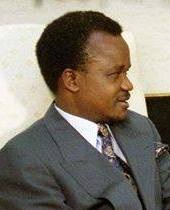 |
|---|
The members of the National Assembly of Zambia from 1991 until 1996 were elected on 31 October 1991. Of the 150 elected members, 125 were from the Movement for Multi-Party Democracy and 25 from the United National Independence Party. [1]
 |
|---|
The members of the National Assembly of Zambia from 1991 until 1996 were elected on 31 October 1991. Of the 150 elected members, 125 were from the Movement for Multi-Party Democracy and 25 from the United National Independence Party. [1]
| Type | Member | Party |
|---|---|---|
| Speaker | Robinson Nabulyato | Independent |
| Nominated | William Harrington | Movement for Multi-Party Democracy |
| Nominated | Katele Kalumba | Movement for Multi-Party Democracy |
| Nominated | Kabunda Kayongo | Movement for Multi-Party Democracy |
| Nominated | Mwami Maunga | Movement for Multi-Party Democracy |
| Nominated | Godfrey Miyanda | Movement for Multi-Party Democracy |
| Nominated | Zilole Mumba | Movement for Multi-Party Democracy |
| Nominated | Hosea Soko | Movement for Multi-Party Democracy |

The politics of Zambia takes place in a framework of a presidential representative democratic republic, whereby the president of Zambia is head of state, head of government and leader of a multi-party system. Executive power is exercised by the government, while legislative power is vested in both the government and parliament. Formerly Northern Rhodesia, Zambia became a republic immediately upon attaining independence in October 1964.

The Movement for Multi-party Democracy (MMD) also known as New Hope MMD is a political party in Zambia. Originally formed to oust the previous government, MMD controlled an absolute majority in parliament between 1991 and 2001, when its past leader, Frederick Chiluba was President of Zambia. Its election into power in 1991 ended the 27-year rule of President Kenneth Kaunda and his United National Independence Party (UNIP). It remained the dominant party within Zambian politics until the general elections of September 2011.

The president of Zambia is the head of state and the head of government of Zambia. The office was first held by Kenneth Kaunda following independence in 1964. Since 1991, when Kaunda left the presidency, the office has been held by seven others: Dr. Frederick Chiluba, Levy Mwanawasa, Rupiah Banda, Michael Sata, Edgar Lungu and the current president Hakainde Hichilema, who won the 2021 presidential election. In addition, acting president Guy Scott served in an interim capacity after the death of President Michael Sata.

The United Party for National Development (UPND) is a liberal political party in Zambia, led by Hakainde Hichilema, the current president of the country. The party is an observer member of the Africa Liberal Network.

The United National Independence Party (UNIP) is a political party in Zambia. It governed the country from 1964 to 1991 under the socialist presidency of Kenneth Kaunda, and was the sole legal party in the country between 1973 and 1990. On 4 April 2021, Bishop Trevor Mwamba was elected President of UNIP.

Elections in Zambia take place within the framework of a multi-party democracy and a presidential system. The President and National Assembly are simultaneously elected for five-year terms.

The National Assembly is Zambia's unicameral legislative body. Between 1972 and 1990, Zambia was a one-party state with the United National Independence Party (UNIP) as the sole legal party.

General elections were held in Zambia on 19 December 1968 to elect the National Assembly and President. The first post-independence polls saw incumbent Kenneth Kaunda retain his post as president, whilst his United National Independence Party, the only party to field candidates in all 105 constituencies, won 81 of the 105 seats in the National Assembly. Voter turnout was 82.5% in the parliamentary election, but 87.1% in the presidential election.

General elections were held in Zambia on 5 December 1973. They were the first elections held since the country was formally declared a one-party state in August, with the United National Independence Party (UNIP) as the only legally permitted party. UNIP leader Kenneth Kaunda was automatically elected to a third five-year term as President, and was confirmed in office via a referendum in which 88.8% of voters approved his candidacy. UNIP also won all 125 seats in the National Assembly. Voter turnout was 39% of the 1,746,107 registered voters for the presidential election, and 33% for the National Assembly election.

General elections were held in Zambia on 12 December 1978. At the time, the country was a one-party state with the United National Independence Party (UNIP) as the sole legal party. UNIP leader Kenneth Kaunda was automatically elected to a fourth five-year term as President, with 80.7% of voters voting to confirm him in office. UNIP also won all 125 seats in the National Assembly. Voter turnout was around 65% in the parliamentary election, but 66.7% in the presidential election.

General elections were held in Zambia on 27 October 1983. At the time, the country was a one-party state, with the United National Independence Party (UNIP) as the only legally permitted party. Its leader, Kenneth Kaunda was automatically re-elected for a fifth term as President, and was confirmed in office with over 95% of the vote. UNIP also won all 125 seats in the National Assembly. Voter turnout was around 63% in the parliamentary election, but 65.5% in the presidential election.

General elections were held in Zambia on 26 October 1988. At the time, the country was a one-party state with the United National Independence Party (UNIP) as the sole legal party. UNIP leader Kenneth Kaunda was automatically re-elected for a sixth five-year term as President with 95.5% of the vote, whilst UNIP also won all 125 seats in the National Assembly. Voter turnout was around 60% in the parliamentary elections, but 58.8% in the presidential elections.

General elections were held in Zambia on 31 October 1991 to elect a President and National Assembly. They were the first multi-party elections since 1968, and only the second multi-party elections since independence in 1964. The United National Independence Party (UNIP), which had led the country since independence, was comprehensively beaten by the Movement for Multi-Party Democracy (MMD). Kenneth Kaunda, who had been president since independence, was defeated in a landslide by MMD challenger Frederick Chiluba in the presidential elections, whilst the MMD won 125 of the 150 elected seats in the expanded National Assembly. Voter turnout was 45%.

General elections were held in Zambia on 18 November 1996 to elect a President and National Assembly. They were boycotted by the main opposition party, the United National Independence Party, together with five other allied parties, following changes to the constitution which they failed to have reversed following a court challenge. The changes imposed a two-term limit on the presidency, required presidential candidates to be born to two Zambian citizens by birth or descent, and required National Assembly candidates to give up their chieftaincy. UNIP believed these changes were specifically aimed at their longtime leader, Kenneth Kaunda, whose parents were Malawian and had previously served as the country's first president from 1964 to 1991. The changes would have also excluded UNIP's vice president, a chief. Subsequently, the ruling Movement for Multi-Party Democracy won a comfortable victory in both elections, taking 131 of the 150 elected seats in the National Assembly, and its candidate, Frederick Chiluba, winning 73% of the vote in the presidential election.

General elections were held in Zambia on 20 September 2011, electing a President and members of the National Assembly. Michael Sata of the Patriotic Front (PF) won the presidential elections, defeating incumbent Rupiah Banda of the Movement for Multi-Party Democracy (MMD), and was sworn into office on 23 September. The PF emerged as the largest party in the National Assembly, winning 60 of the 148 seats decided on election day.
Benjamin Yoram Mwila, often known as BY, was a Zambian politician and businessman. Mwila was a prominent leader and co-founder of the Zambia Republican Party. He served as an MP for Luanshya in the National Assembly. Mwila held several cabinet portfolios within the cabinet of President Frederick Chiluba during the 1990s, including Minister of Defence from 1991 to 1997.

General elections were held in Zambia on 11 August 2016 to elect the President and National Assembly. A constitutional referendum was held alongside the elections, with proposals to amend the bill of rights and Article 79.
Amusaa Katunda Mwanamwambwa was a Zambian politician. He was a member of the National Assembly for Liuwa between 1991 and 1998, also holding several ministerial posts. In 1998 he became Speaker of the National Assembly, a post he held until 2011.